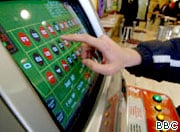Gamblers in Scotland staked £4.4 billion on high stake machines last year, a rise of over £100 million according to new figures.
The amount of money gambled on fixed odds betting terminals (FOBTs), dubbed the “crack cocaine of gambling”, rose by £176 million.
The money staked on the terminals equates to £1,057 per adult in the country.
Statistics
The statistics came from betting industry data, and were produced by the Campaign for Fairer Gambling.
The group warned of a “toxic economy” developing and called for the Government to act.
FOBTs allow people to bet money on virtual versions of games like blackjack and roulette.
Restart
But because the machines are computerised, they are very quick to restart a new game when one has just finished.
Gamblers are able to stake £100 a spin and up to £18,000 an hour.
Pamela Nash, Labour MP for Airdrie and Shotts, said she would like to see the maximum stake for FOBTs reduced to £2.
Toxic
A spokesman for the Campaign for Fairer Gambling, Adrian Parkinson, said the number of machines is showing “exceptional” levels of growth across Scotland.
Mr Parkinson, a former betting shop manager, said: “FOBTs are the most addictive gambling product in the country and are driving the proliferation of betting shops.”
He added: “Combined with the pay-day loan shops, we are seeing the rise of a toxic economy on Scotland’s high streets.”
Concern
He said the Scottish Government should be doing more to “clamp down” on the bookmakers and their addictive machines.
Mr Parkinson said: “The social and economic consequences of this continued rise are causing concern among politicians but governments are failing to act.”
The Association of British Bookmakers, the gambling industry body, say the figures are flawed.
A spokesman said: “However you present the figures, they don’t provide evidence for a link between problem gambling and electronic gaming machines in betting shops.”

